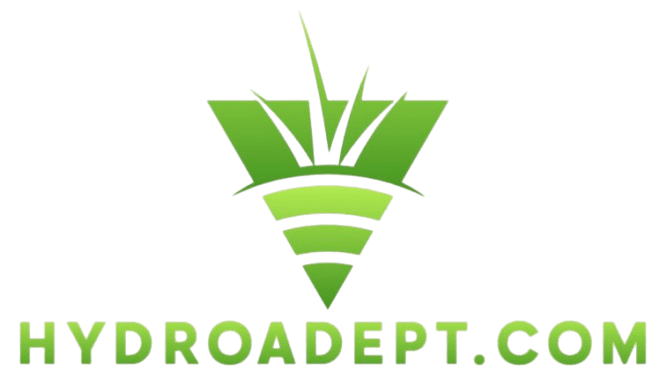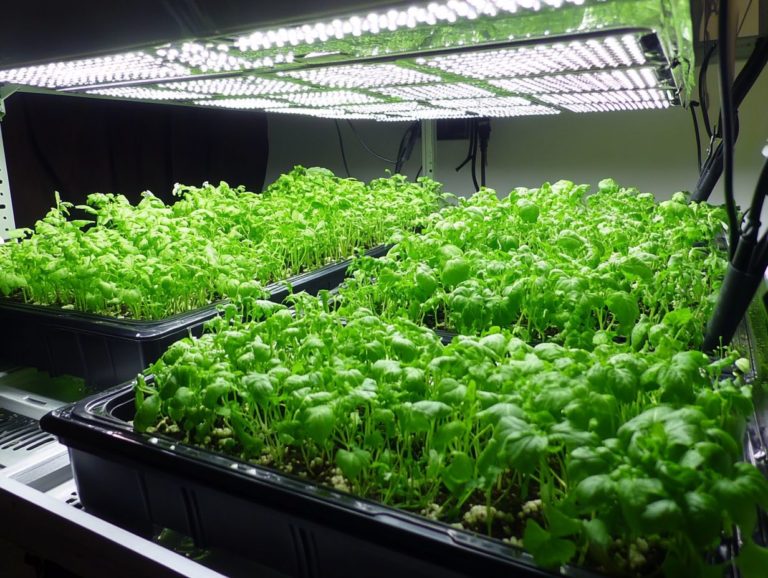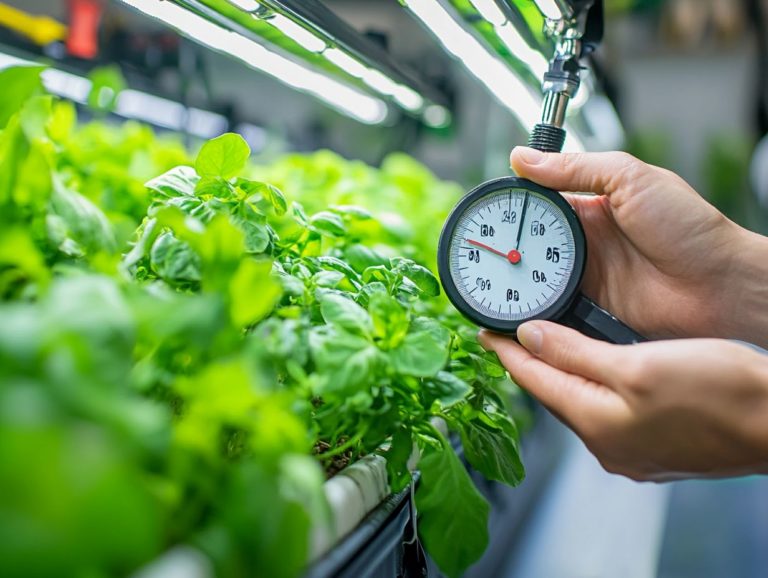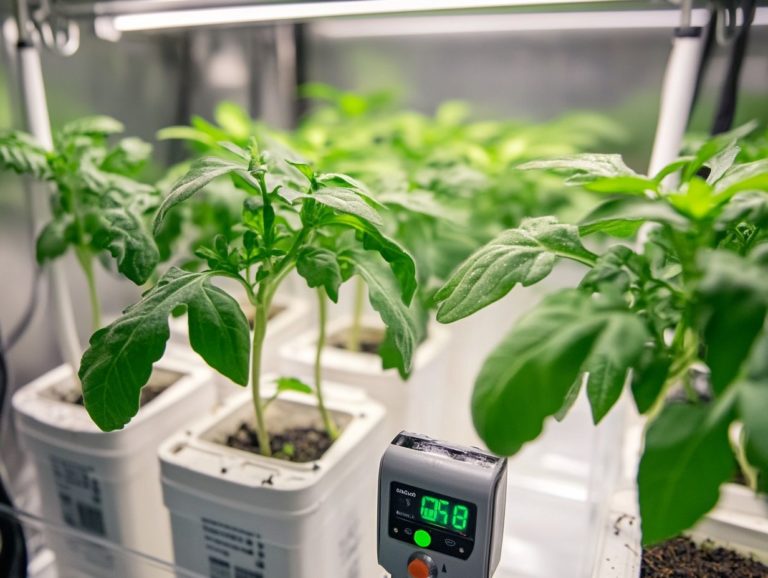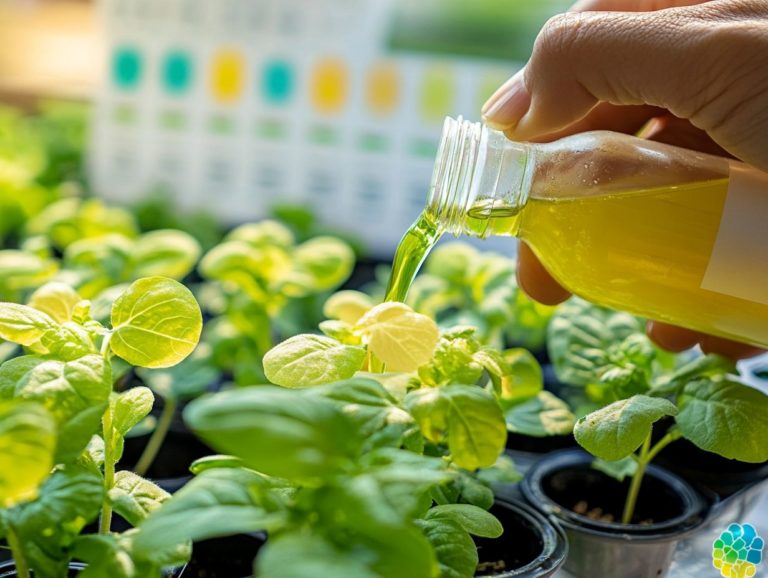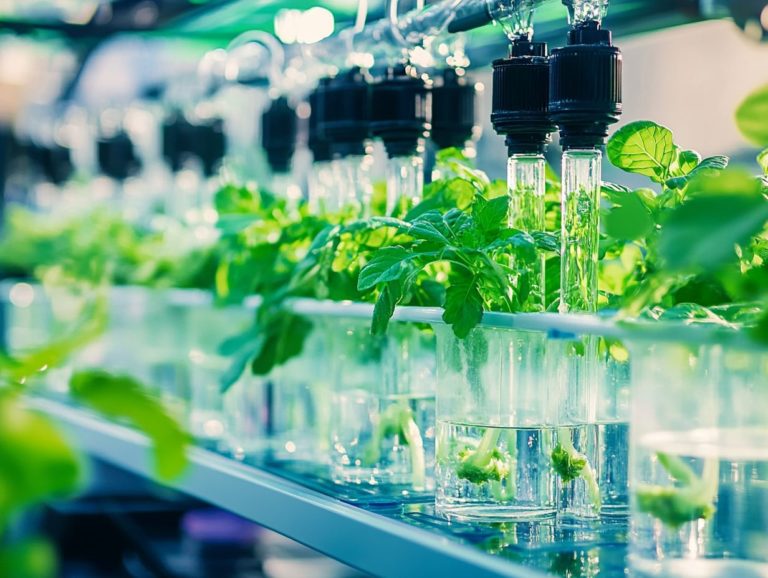Common Pests in Hydroponic Gardens
Pest management plays a vital role in ensuring the health and productivity of your hydroponic gardens. Effective pest control is essential to safeguard your plants.
Given the unique growing conditions of these systems, they can attract specific pests that pose a threat to your crops.
This article delves into various types of hydroponic pests you may encounter. It highlights effective prevention strategies and methods for controlling infestations.
It also examines organic pest control options. Additionally, it discusses the challenges of pesticide resistance.
By grasping these essential elements of indoor farming, you will empower yourself to protect your hydroponic investments more effectively.
Contents
- Key Takeaways:
- Types of Pests in Hydroponic Gardens
- Preventing Pests in Hydroponic Gardens
- Controlling Pests in Hydroponic Gardens
- Organic Pest Control in Hydroponic Gardens
- Natural and Non-Toxic Solutions
- Dealing with Pesticide Resistance
- Frequently Asked Questions
- What are some common pests that can affect hydroponic gardens?
- How do I identify pest infestations in my hydroponic garden?
- What steps can I take to prevent pests in my hydroponic garden?
- How do I get rid of aphids in my hydroponic garden?
- What are the dangers of using chemical pesticides in a hydroponic garden?
- Can pests transfer from traditional gardens to hydroponic gardens?
Key Takeaways:
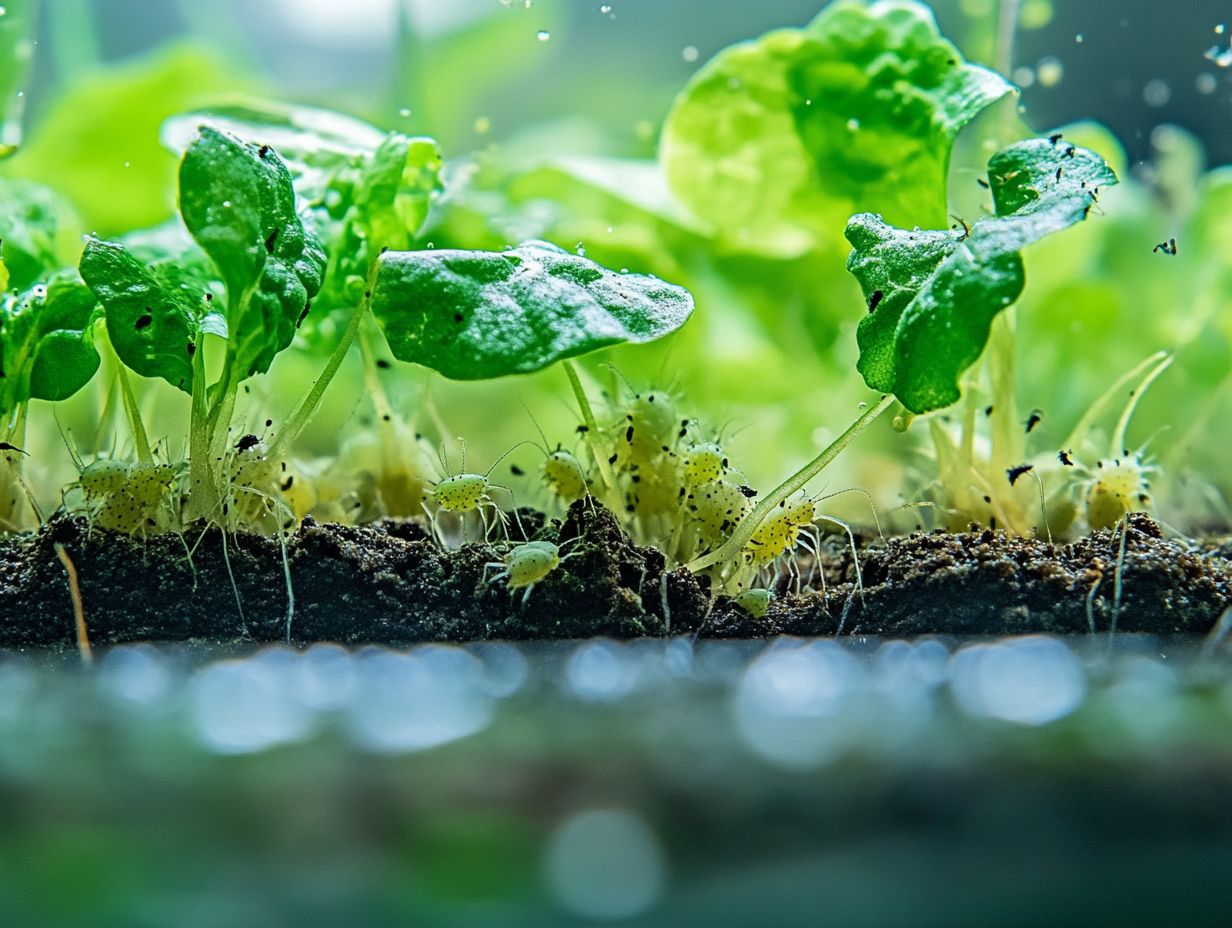
- Proper pest management is crucial for hydroponic garden success.
- Common pests in these gardens include aphids, thrips, and fungus gnats.
- Preventing and controlling pests can be achieved through effective strategies and organic solutions.
Understanding the Importance of Pest Management
Pest management is essential in hydroponic farming. It significantly affects your plants’ health, growth, and yields.
By employing effective pest control strategies, you can mitigate the impact of common pests like spider mites, aphids, and whiteflies that thrive in greenhouse conditions.
Implementing preventive measures early on allows you to protect your crops against potential infestations. This enhances your overall indoor farming experience.
Recognizing the importance of pest management leads to healthier plants. It maximizes productivity in hydroponic farming systems.
Effective management is also crucial for preventing plant diseases such as root rot and powdery mildew.
These infections can quickly devastate your crops and lead to significant financial losses.
Use combined pest control methods like regular monitoring and introducing beneficial insects or eco-friendly treatments to maintain a balanced ecosystem.
This proactive approach not only preserves plant health but also cultivates a thriving hydroponic environment. Your plants can achieve their full growth potential.
Incorporating sound pest management practices translates to healthier yields and a reduced incidence of disease.
Types of Pests in Hydroponic Gardens
Hydroponic gardens face various pests that can jeopardize plant health. These include spider mites, whiteflies, aphids, and thrips.
If these invaders go unchecked, they can inflict considerable damage. This often leads to plant diseases that threaten the viability of your crops.
To ensure effective pest control and preserve optimal conditions, it s crucial to understand the types of hydroponic pests.
Identifying and Classifying Common Pests
Identifying and classifying common pests in your hydroponic garden is essential for implementing effective pest control strategies.
Key offenders like spider mites, whiteflies, aphids, and thrips can be recognized by their distinctive characteristics and behaviors.
To pinpoint these pests effectively, watch for specific signs like the tiny, moving bodies of aphids or the fluttering wings of whiteflies when disturbed.
Using a magnifying glass can significantly enhance your visibility. This allows you to discern the intricate patterns and colors of these insects.
Catching a pest early can help prevent larger infestations. Understanding their life cycles will enable you to choose targeted, eco-friendly treatments.
These treatments protect the health of your hydroponic system while preserving beneficial organisms.
Preventing Pests in Hydroponic Gardens
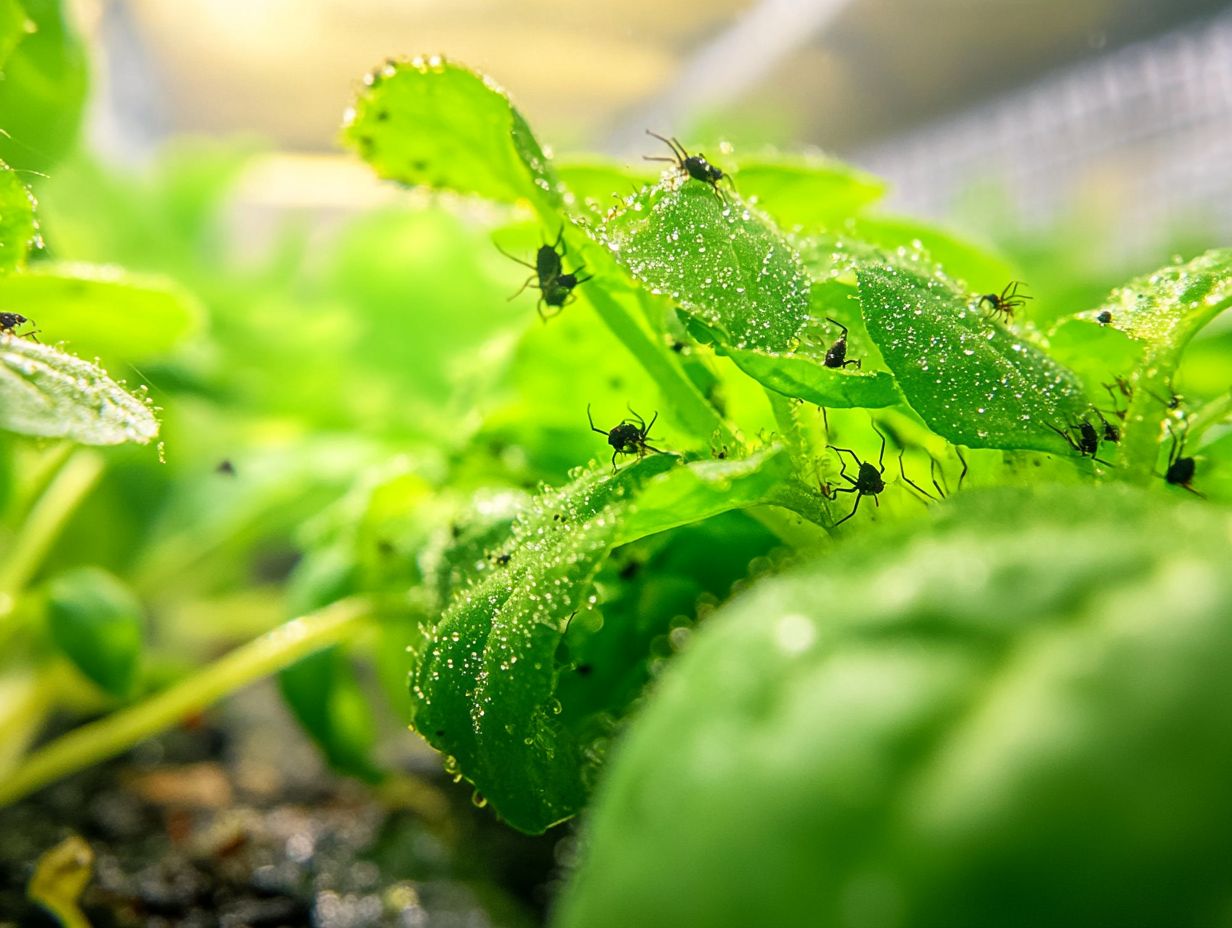
Preventing pests in hydroponic gardens is crucial for safeguarding the health and productivity of your plants. Implementing proactive strategies, such as introducing beneficial insects like ladybugs and nematodes, can establish a balanced ecosystem.
Maintaining ideal greenhouse conditions and adhering to strict hygiene practices will greatly diminish the risk of infestations. This allows your hydroponic farm to thrive.
Effective Strategies for Pest Prevention
Implementing effective strategies for pest prevention is essential in your hydroponic garden to ensure the health of your crops. Techniques like using neem oil, setting up sticky traps, and applying soapy spray create a comprehensive defense against common hydroponic pests. By weaving these preventive measures into your routine care, you ll see a big drop in pest threats.
Consider adding beneficial insects such as ladybugs and lacewings. They act as natural predators, effectively combating aphids and thrips. Maintaining optimal environmental conditions, including humidity and temperature levels, can also help deter pests from establishing a foothold.
Regular inspections of your plants will allow for early detection of infestations, giving you the opportunity to act swiftly to protect your plants! Using organic fungicides and insecticidal soaps as needed further protects your crops, reinforcing their long-term health.
By thoughtfully blending these strategies into your hydroponic systems, you not only shield your yields but also cultivate a thriving, balanced ecosystem.
Controlling Pests in Hydroponic Gardens
Controlling pests in your hydroponic garden is essential for maintaining plant health and maximizing your yields. It’s important to implement effective pest control measures specifically designed to target troublesome pests like spider mites and whiteflies, all while preventing secondary issues such as gray mold.
Utilizing solutions like insecticidal soap and neem oil can effectively address these threats, ensuring that your approach has a minimal impact on the surrounding ecosystem.
Methods for Managing and Eliminating Pests
Effective methods for managing and eliminating pests in your hydroponic systems include using insecticidal soap and neem oil, both of which are renowned for their efficacy against a variety of pests. These organic solutions not only assist in pest control but also help prevent conditions like root rot and powdery mildew that can develop from unchecked infestations. By integrating these methods into your routine, you can foster healthier plants and enhance your yields.
Insecticidal soap shines when it comes to tackling soft-bodied insects like aphids and spider mites, while neem oil disrupts the life cycle of various pests, including whiteflies and fungus gnats. Timing your applications is crucial; it’s best to treat your plants during the early morning or late afternoon to shield them from the harsh effects of direct sunlight.
Always adhere to the label instructions regarding dosage. A dilution of 1-2% for neem oil is typically effective, while insecticidal soap tends to yield the best results when plants are thoroughly coated. Regular applications every 7-14 days can significantly diminish pest populations, creating a robust growth environment that you can count on.
Organic Pest Control in Hydroponic Gardens
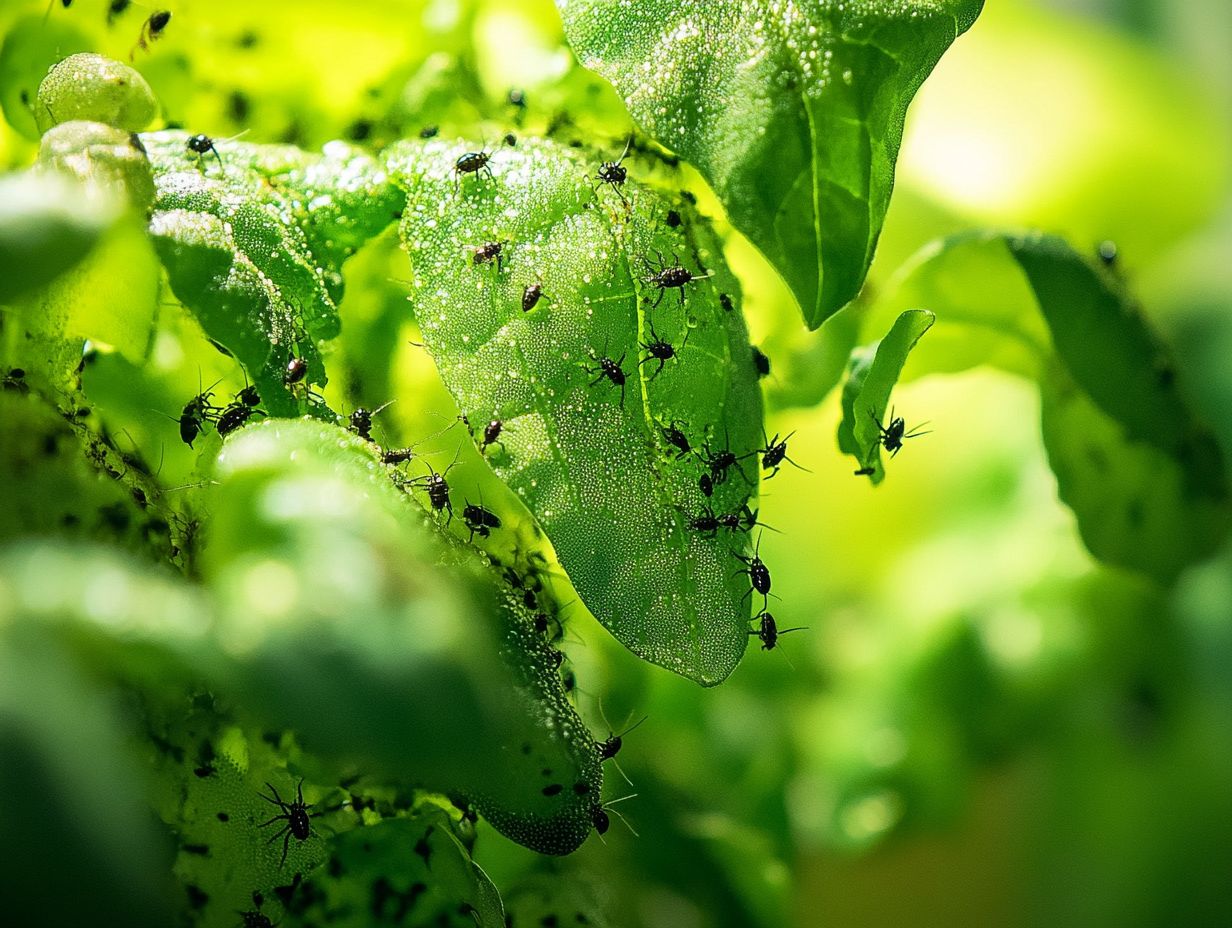
Organic pest control in hydroponic gardens presents a smart and sustainable method for managing pest populations while safeguarding plant health. By employing natural solutions like neem oil, beneficial insects, and soapy sprays, you can effectively combat pests without turning to harsh chemicals.
This approach not only protects your crops but also upholds the integrity of the hydroponic ecosystem you ve cultivated.
Take action now! Implement these strategies to ensure a healthier garden and thriving plants.
Natural and Non-Toxic Solutions
Natural and non-toxic solutions are becoming the go-to choice for hydroponic gardeners who want to manage pests without resorting to harsh chemicals. Think of options like neem oil, beneficial insects such as ladybugs, and soapy sprays as your reliable allies in combating hydroponic pests. These alternatives not only protect your crops but also foster a healthy growing environment.
They deter pests while preserving the balance of beneficial organisms in your hydroponic system. By incorporating these pest control strategies for hydroponic gardens, you can effectively target specific nuisances like aphids, spider mites, and whiteflies while minimizing the impact on your hydroponic ecosystem.
Neem oil works as a powerful repellent with anti-feedant properties. Introducing ladybugs can naturally keep aphid populations in check. Soapy sprays serve as a tactical approach, breaking down the protective coatings of soft-bodied insects, thus simplifying your pest management efforts.
By emphasizing a diverse approach to pest control, you’re not just safeguarding your crops; you’re also ensuring the ongoing health of beneficial microorganisms essential for maintaining long-term productivity in your hydroponic setup. For more information, check out this guide on how to identify pest problems in hydroponics.
Dealing with Pesticide Resistance
Navigating pesticide resistance is an increasingly crucial challenge for hydroponic gardeners striving for effective pest control. Pests like spider mites and whiteflies have a knack for developing resistance to chemical treatments, which means that traditional pest control methods can lose their effectiveness over time.
By adopting integrated pest management using different methods together to control pests you can significantly reduce the risk of resistance and pave the way for lasting success in pest management.
Understanding and Overcoming Resistance
Understanding and overcoming pesticide resistance is essential for maintaining effective pest control in your hydroponic garden. As pests evolve and adapt, the methods you relied on may no longer be effective, prompting the need for a more refined pest management approach.
Pesticide resistance develops when pests undergo genetic changes, allowing them to survive treatments that once eliminated them. This can lead to a surge in resistant pest populations, making it imperative for you to be proactive in your pest control methods.
Integrated pest management promotes diverse strategies, including biological control, habitat manipulation, and careful application of chemical treatments. This allows for a well-rounded approach.
Your adaptability in these strategies is vital; as conditions shift and pest populations change, so too must your techniques. This ensures sustainable management practices that protect both your plants and the environment.
Frequently Asked Questions
Got questions about your hydroponic garden? Here are some answers to help you thrive!
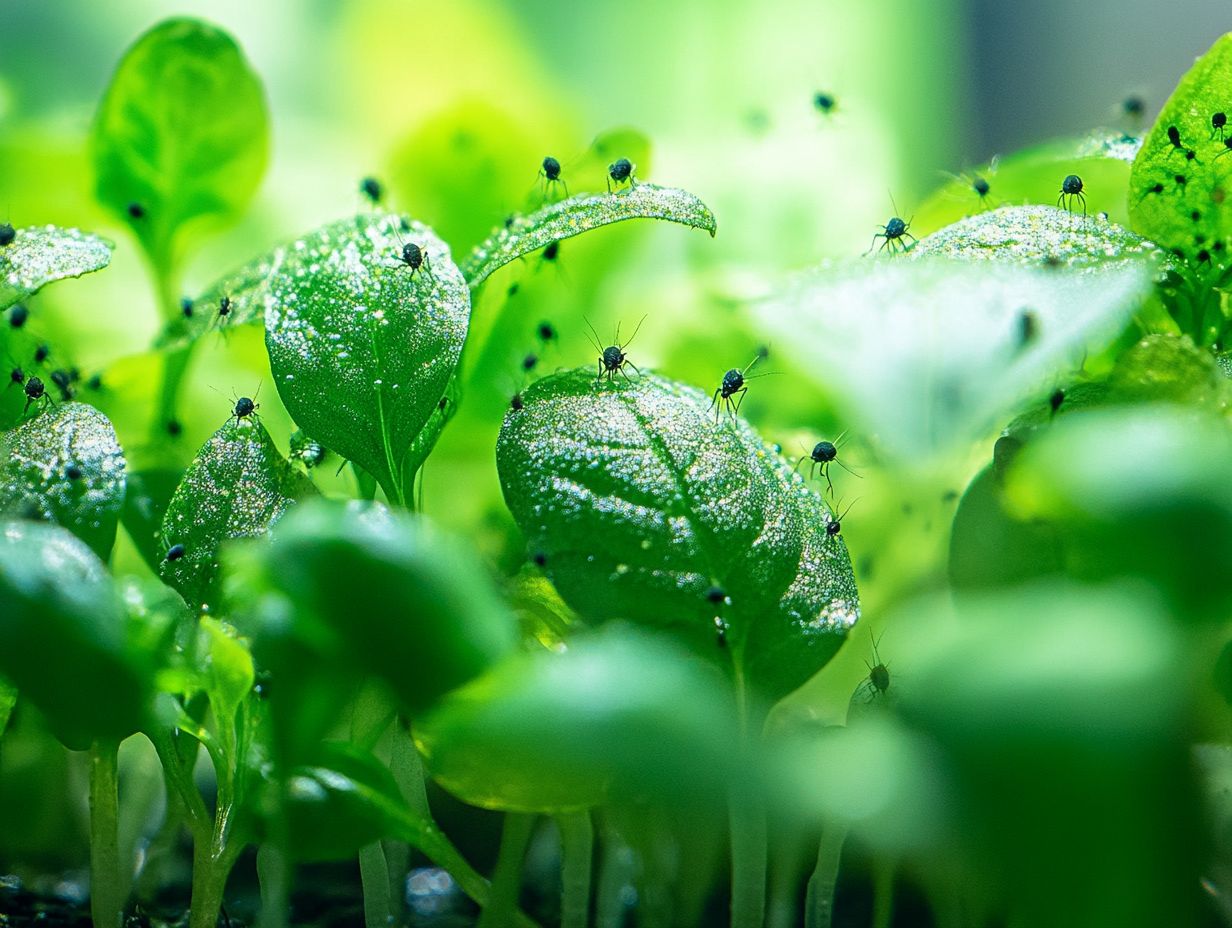
What are some common pests that can affect hydroponic gardens?
- Aphids
- Spider mites
- Thrips
- Whiteflies
- Fungus gnats
How do I identify pest infestations in my hydroponic garden?
You can identify pest infestations by regularly inspecting your plants for signs of damage, such as wilting, discoloration, or small holes in the leaves. You may also see the pests themselves or their eggs on your plants.
What steps can I take to prevent pests in my hydroponic garden?
To prevent pests, keep your hydroponic garden clean and free of debris. Avoid overwatering and maintain proper ventilation to discourage pests from breeding. You can also use natural pest deterrents like ladybugs or neem oil.
How do I get rid of aphids in my hydroponic garden?
If you spot aphids, try using a solution of water and dish soap to remove them from your plants. Natural predators like ladybugs or organic insecticides designed for hydroponic gardens are also effective options.
Implement these methods today and share your experiences for even better results!
What are the dangers of using chemical pesticides in a hydroponic garden?
Chemical pesticides can harm your plants. They can also be dangerous to your health if ingested.
These chemicals upset the balance of helpful bugs and bacteria in your hydroponic system. It’s best to find safer alternatives to keep your garden healthy.
Can pests transfer from traditional gardens to hydroponic gardens?
Yes, pests can easily move from traditional gardens to hydroponic ones. They can hitch a ride on contaminated tools, soil, or plants.
Always clean and disinfect your tools and materials before using them in your hydroponic garden. This step is vital to prevent pest infestations.
